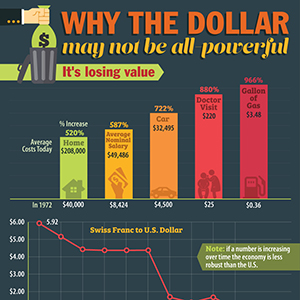The Decline of the Dollar
Why the dollar may not be all-powerful
It’s losing value
1972: Dollar removed from gold standard[4]
Average costs:
Car: $4,500
Home: $40,000
Gallon of gas: $.36
Visit to the doctors: $25.00
Average nominal salary: $8,424
Today: [price || percentage increase]
Car: $32,495[5] || 722%
Home: $208,000[7] || 520%
Gallon of gas: $3.48[8] || 966%
Visit to the doctors: $220[9] || 880%
Average nominal salary: $49,486[10] || 587%
Swiss Franc to US Dollar
1920:5.92
1930: 5.16
1940: 4.41
1950: 4.37
1960: 4.37
1970: 4.377
1986: 1.67
1995: 1.38
2009: 1.68
Today: 1.03[11]
Note: If a number increases over time, this means the economy is less robust than the US
It’s only upheld by its status as the de facto world currency
Year 2000:
U.S. Dollars: 71.129%
Pounds Sterling: 2.753%
Japanese Yen: 6.065%
Swiss Francs: .269%
Euros: 18.29%
Other Currencies: 1.493%
Year 2005:
U.S. Dollars: 66.515%–down
Pounds Sterling: 3.747%–up
Japanese Yen: 3.96%–down
Swiss Francs: .146%–down
Euros: 23.889%–up
Other Currencies: 1.742%–up
Year 2010:
U.S. Dollars: 61.841%–down
Pounds Sterling: 3.935%–up
Japanese Yen: 3.656%–down
Swiss Francs: .128%–down
Euros: 26.03%–up
Other Currencies: 4.437%–up
Year 2013:
U.S. Dollars: 60.928%–down
Australian Dollars: 1.819%–down
Canadian Dollars: 1.864%–up
Pounds Sterling: 4%–up
Japanese Yen: 3.851%–up
Swiss Francs:.269%–up
Euros: 24.453%–down
Other Currencies: 2.816%–down
A currency is only as strong as the country that upholds it
S&P Foreign Currency Rating:[18]
AAA Nations:
Australia
Canada
Germany
Hong Kong
Luxembourg
Norway
Switzerland
United Kingdom
AA Nations:
Abu Dhabi
Austria
Belgium
Chile
China
Czech Republic
Estonia
Finland
France
Guernsey
Japan
Jersey
Kuwait
New Zealand
Qatar
Saudi Arabia
Taiwan
US
Profile on the US:
An AA rating means “An issuer or obligation rated ‘AA’ should be able to withstand a severe level of stress and still meet its financial obligations. Such a scenario could include GDP declines of up to 15%, unemployment levels of up to 20%, and stock market declines of up to 70%.”
In other words, the US would default on debt in the event of an other great depression.
As opposed to a AAA rating — a nation who could withstand the likes of the US Great Depression.
But central banks are dumping the dollar
As the IMF measures the value of central bank reserves in SDRs:
[20]SDR–(Special Drawing Rights) is a reserve currency established by the International Monetary Fund whose value is established by consulting the values of the Euro, Japanese Yen, Pound Sterling, and US Dollar.
Nations are emphasizing SDRs to bolster the string of their holdings
Pros:
Accurately measure nations trade deficits or surpluses
Stabilize the average prices of commodities
The international medium off exchange
And store of value
Cons:
Nations with holdings predominantly of one SDR sub-currency have less SDR value
SDR reserve assets in millions[19]
[#and whether the number of SDRs in their reserves increased since the year previous]
China: 2,494,400–up
Japan: 804,249–up
Switzerland: 323,221–up
Russia: 306,102–down
Brazil: 231,384–down
Korea: 221,968–up
India: 180,169–up
Mexico: 114,056–up
United States: 95,862.53–down
Turkey: 72,615.2–up
Poland: 66,502.77–down
Indonesia: 62,661.57–down
United Kingdom: 60,351.58–up
Denmark: 55,983.61–down
Israel: 53,107–up
Germany: 47,555.09–down
Canada: 46,640–up
Sweden: 39,423–up
Norway: 37,846–up
Czech Republic: 36,244–up
France: 35,759–down
Italy: 35,729–up
Australia: 32,301–up
Hungary: 30,126–up
South Africa: 29,273–up
The minimized role of the USD in SDR’s shows a different view on the health of reserve currencies worldwide.
Besides diversifying, the Remnimbi is on a tear
Profile:[15]
Remnimbi (Chinese Yuan): 2nd most used currency in trade finance
Total Chinese trade settled in Remnimbi:
2010: 3%
2014: 18%
That’s like if–within 4 years–Bitcoin were suddenly used for 1/5 US purchases.
Financial institutions doing business with remnimbis
2011:900
2014: 10,000+
Citations:
- http://www.theguardian.com/business/2011/feb/10/imf-boss-calls-for-world-currency
- http://www.washingtonsblog.com/2010/08/u-s-postal-service-starts-quoting-sdr-to-dollar-conversion-rates-and-imf-endorses-replacing-dollars-with-sdrs.html
- http://coinmill.com/SDR_USD.html
- http://www.shtfplan.com/headline-news/how-the-u-s-dollar-will-be-replaced_05172012
- http://www.marketwatch.com/story/new-car-transaction-prices-jump-nearly-3-percent-in-august-2014-according-to-kelley-blue-book-2014-09-03
- http://www.reuters.com/article/2012/05/16/us-usa-fed-idUSBRE84F12320120516
- http://ycharts.com/indicators/sales_price_of_existing_homes
- http://www.eia.gov/tools/faqs/faq.cfm?id=287&t=10
- http://www.bluecrossma.com/blue-iq/pdfs/TypicalCosts_89717_042709.pdf
- http://www.davemanuel.com/median-household-income.php
- http://www.bloomberg.com/quote/CHFUSD:CUR
- http://elibrary-data.imf.org/ViewData.aspx?qb=4c654d9591231f91837d506f10123d6f
- http://www.reuters.com/article/2013/12/03/us-markets-offshore-yuan-idUSBRE9B204020131203
- http://elibrary-data.imf.org/QueryBuilder.aspx?s=321&key=1445284&f=1&ts=1&ys=2002&ye=2011&ms=1&me=12&ds=1&de=31&did=323&id=204
- http://www.centralbanking.com/central-banking-journal/advertisement/2357296/renminbi-as-a-reserve-currency
- http://en.wikipedia.org/wiki/Tables_of_historical_exchange_rates_to_the_United_States_dollar
- https://www.globalcreditportal.com/ratingsdirect/renderArticle.do?articleId=1331219&SctArtId=257653&from=CM&nsl_code=LIME&sourceObjectId=5435305&sourceRevId=7&fee_ind=N&exp_date=20240818-02:07:33
- http://www.standardandpoors.com/ratings/sovereigns/ratings-list/en/us/;jsessionid=zsCTJygTcTXZTQxjLk9d3R3ck5J1fY69SHbQ5mKRzQFG8TnQbchy!-391941799?subSectorCode=&start=50&range=50
- http://stats.oecd.org/index.aspx?queryid=169
- http://www.imf.org/external/np/exr/facts/sdr.HTM
 Follow
Follow
